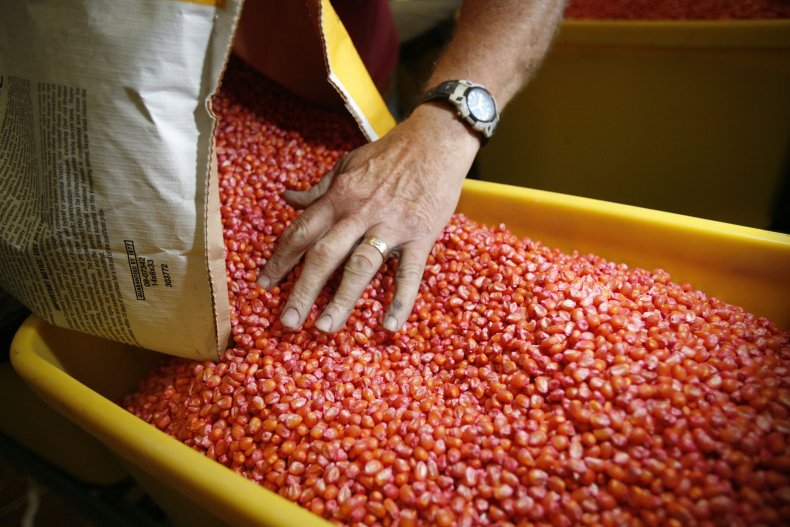Iowa Farmers Accuse China of Stealing American Seeds
Farmers in Iowa are accusing the Chinese state of stealing valuable seed samples from America, that have been genetically modified to improve crops, in order to reproduce them back home.
A bipartisan delegation from Congress hosted a roundtable in Dysart, a town in central Iowa, on Thursday to hear from locals about "the impacts of the [Chinese Communist Party's] malign tactics to undermine American agriculture." The area has previously been visited by Chinese nationals to dig up the improved seeds.
It comes at a time of heightened sensitivity in the U.S. towards China amid a cooling of relations between the two nations, fueled by the appearance of a spy balloon over America earlier in the year and an ongoing trade war.
Three members of the House Select Committee on the CCP travelled to the rural area to speak with stakeholders in the local agricultural industry about what it described as the "ongoing attempts to steal America's agriculture technology."

It cited a 2012 case in which a Dysart farmer spotted a man in business attire digging up hybrid seeds, which were then sent back to China. Mo Hailong was later arrested by the FBI for stealing U.S. agriculture trade secrets, and convicted of various crimes related to the long-term conspiracy in 2016.
"In my opinion, it's part of a much larger, country-wide, slow-motion heist of American intellectual property," Mike Gallagher, chairman of the select committee and a Republican representative from Wisconsin, told the meeting. "We have a duty to protect all our technology, whether it's in Silicon Valley or in a cornfield here in Iowa."
The FBI estimates that Chinese intellectual property theft costs the U.S. economy anywhere between $225 billion and $600 billion a year, describing the east Asian nation as the world's "principal" infringer of proprietary knowledge.topher Wray said that the agency had seen economic espionage cases linked to China increase by around 1,300 percent.
"Both the Trump and Biden administrations have oriented U.S. strategy around competing with the Chinese Communist Party—but we are not competing if we're letting the CCP steal hundreds of billions of dollars from Americans," Gallagher said. "We're throwing the game from the outset. So just like the farmer in the Iowa field, you're being robbed every day in plain sight by the Chinese Communist Party."
"We can't sustain this anymore," Raja Krishnamoorthi, ranking Democratic member on the select committee and a representative for Illinois, told the roundtable.
"We can't have a situation where we're constantly developing secrets and research and doing the hard work of innovating—and then all of a sudden having that stolen from us, especially when agricultural exports, especially from your district and others, are so vital to the economy," he added.
Farmer Louie Zumbach told NewsNation farmers were paying a "tech fee" for genetically modified seeds. "So, when they steal that and they use all that technology for nothing they are stealing from every Iowa farmer and every farmer in America that's using that type of technology," he said.
However, some who attended the meeting expressed caution about the approach taken to solving the issue.
Suzanne Sherron, a sixth-generation Iowa farmer who produces soybeans and corn, called on the members of congress to act "strategically" toward China.
She said: "One out of every three rows of soybeans you saw as you were driving here goes to China—so while there is little doubt that China has targeted the United States' intellectual property and engaged in unfair trade practices, let's proceed cautiously please as there is not another market that can completely replace the Chinese market for the American soybean farmer."
The GOP representative for the district, Ashley Hinson, described the area as a "bread basket" which "truly does feed and fuel the world." She added: "Our land is sacred and we cannot allow the CCP to continue to steal this intellectual property, buy up our farmland and rip off our farmers and manufacturers."
Newsweek approached the Chinese Ministry of Foreign Affairs via email for comment on Friday.
Chinese investment in U.S. land has become a cause for concern in recent years, despite official figures showing it makes up less than one percent of land under foreign ownership.
National security fears were raised earlier this year over the purchase of a parcel of land 12 miles from the Grand Forks Air Force base in North Dakota by the Binzhou-headquartered Fufeng Group, where the company hoped to build a wet corn milling plant.
In a January 27 letter, Andrew Hunter, an assistant secretary of the Department of the Air Force, wrote that it viewed the project as "a significant threat to national security."
Since then, questions have been raised about a mysteriously-owned company which has been able to buy land bordering Travis Air Force Base in California.
There have been several recent legislative efforts to limit Chinese ownership of U.S. soil. In May, Florida introduced a new law banning Chinese nationals from buying land within a five-mile radius of the state's military installations.

No comments:
Post a Comment
Comments always welcome!